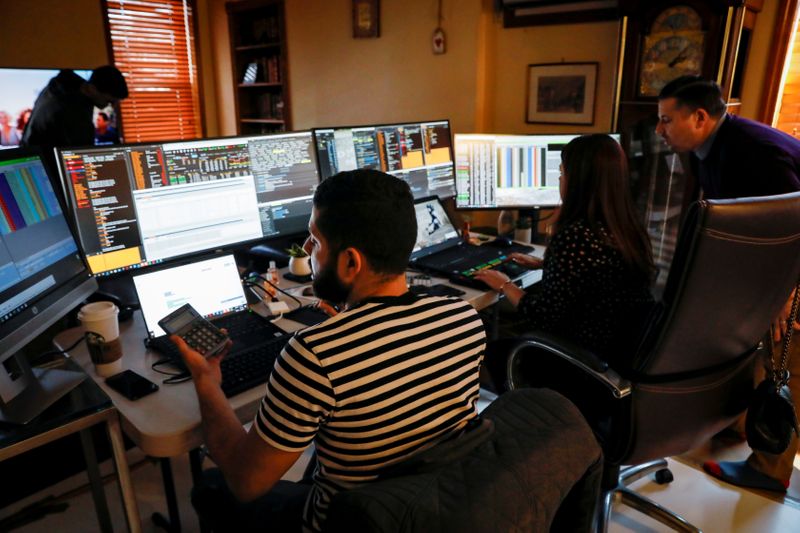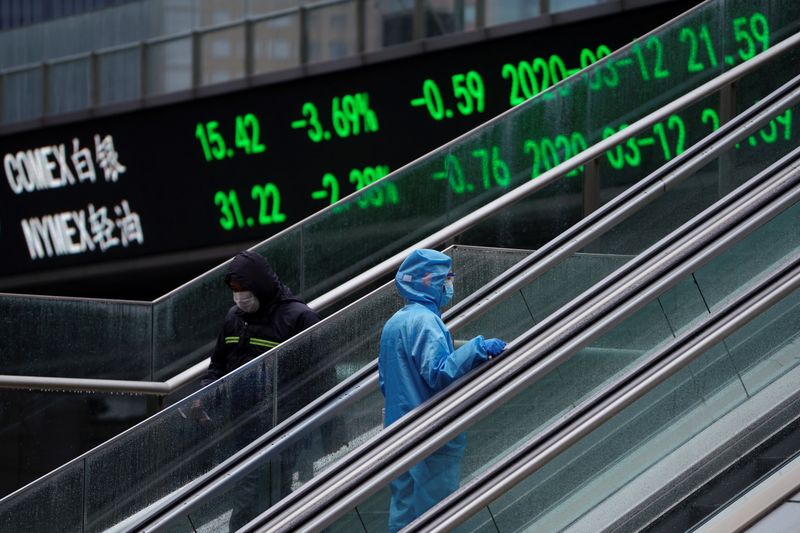By David Randall and Suzanne Barlyn
NEW YORK (Reuters) - Global equity benchmarks moved higher on Thursday following signs of some success by governments and central banks which have taken additional steps to bolster their economies during the COVID-19 pandemic, while oil prices pulled back from an earlier surge.
Oil prices ended the day in negative territory after an earlier surge as OPEC and its allies hammered out an agreement to cut output that was smaller than the market was expecting.
MSCI's gauge of stocks across the globe gained 1.58%.The Dow Jones Industrial Average (DJI) rose 285.8 points, or 1.22%, to 23,719.37; the S&P 500 (SPX) gained 39.84 points, or 1.45%, to 2,789.82 and the Nasdaq Composite (IXIC) added 62.67 points, or 0.77%, to 8,153.58.Gains in the United States were bolstered after the Federal Reserve announced a $2.3 trillion effort to support local governments and small to medium-sized businesses. The U.S. central bank said it would begin buying municipal bonds issued by state and local governments in order to help them respond to the health crisis.
The S&P 500 gained more than 10% since the start of the holiday-shortened week. "Sentiment remains volatile, but investors appear to be looking through the growing headline numbers of COVID-19 cases and focusing on signs that the spread of the pandemic is being brought under control, which in turn is underpinning hopes for a relatively swift relaxation of containment measures," said Mark Haefele, chief investment officer at UBS Global Wealth Management.
On Thursday, New York Governor Andrew Cuomo said the state's efforts at social distancing were working in getting the virus under control in the epicenter of the U.S. outbreak.
New cases in hospitals fell to a low of 200 in a sign that the disease's curve was flattening in the state. But New York state also recorded a record-high 799 deaths on Wednesday, for a total of 7,067.
"You can’t relax. The flattening of the curve last night happened because of what we did yesterday," Cuomo said.
Members of U.S. President Donald Trump’s economic team have been bullish on re-opening of the economy.
Asked on CNBC on Thursday whether he believed the U.S. economy could be reopened as soon as next month, Treasury Secretary Steven Mnuchin said, “I do.” As soon as Trump “feels comfortable with the medical issues,” he said.
The euro gained against the dollar (EUR=D3) on hopes euro zone finance ministers would agree on more support for their coronavirus-hit economies.
Yet concerns about the toll of the slowdown measures on the global economy kept a lid on a broad move into riskier assets after U.S. jobless claims data exceeded 6 million for the second straight week, according to data released on Thursday. Benchmark 10-year notes (US10YT=RR) last rose 15/32 in price to yield 0.7175%, from 0.764% late on Wednesday.
"We're probably on pace to lose more jobs in April alone than we lost during the entire Great Recession," said Dante DeAntonio, senior economist at Moody's Analytics in New York.
The Organization of the Petroleum Exporting Countries and its allies, including Russia - a group known as OPEC+ - held talks on Thursday on record oil output curbs of about 15 million barrels per day (bpd) or more, roughly 15% of global supplies, to support prices hammered by the coronavirus crisis, sources involved in the discussions said.
They said the plan included cuts of about 5 million bpd from producers outside the group known as OPEC+ and could be made gradually.

U.S. crude (CLc1) dropped 7.4% to $23.22 a barrel. Brent crude (LCOc1) fell 3% to $31.85 per barrel.
